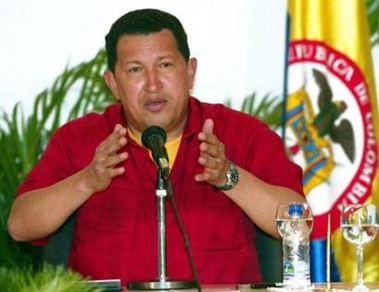|
Chavez applauds Spain for 'resisting' US on arms
(Reuters)
Updated: 2005-11-28 08:55
Venezuela's President Hugo Chavez on Sunday praised Spain for going ahead
with a $1.56 billion sale of military ships and planes to his government despite
U.S. concerns that it could destabilize the region.
Spanish Defense Minister Jose Bono was to arrive in Venezuela on Sunday to
sign the deal for four coastal patrol ships, four corvettes, 10 C-295 transport
planes and two maritime surveillance aircraft.
"I want to acknowledge King Juan Carlos ... and all of Spain for their
firmness in resisting the imperialist government's attempt to trample over
them," Chavez said on his regular broadcast. "Now they don't even want us to buy
patrol boats and vessels to protect our coast and some transport planes."
A former army officer allied with Cuba, Chavez is at odds with
Washington over his self-described socialist revolution and charges by U.S.
officials that he has become a threat to stability in Latin America.
Flush with cash from high oil prices, Venezuela has sought out arms deals
with Russia, Brazil and Spain to beef up its frontier security and modernize its
armed forces. Russia is selling Caracas 100,000 Kalashnikov rifles and at least
10 military helicopters.

Venezuelan President Hugo Chavez talks at a
news conference after signing mutual agreements with Colombian President
Uribe Velez in Falcon state, to the west of Caracas, November 24, 2005.
[Reuters] | U.S. officials say they fear Venezuelan weapons could end up in the hands
of FARC rebels in neighboring Colombia that Washington has listed as
terrorists. Chavez denies charges from some U.S. and Colombian officials that he
backs the guerrillas.
The U.S. ambassador to Spain said last week that Washington was still
considering whether to allow Spain to sell aircraft with U.S. technology. The
planes have 50 percent to 60 percent U.S. components and would therefore require
a U.S. export license.
But Ambassador Eduardo Aguirre made clear the United States did not want the
deal to proceed.
"We hope, in the end, that the transaction will not be carried out," he said.
"We're worried that the sale could be a destabilizing factor in the region."
|